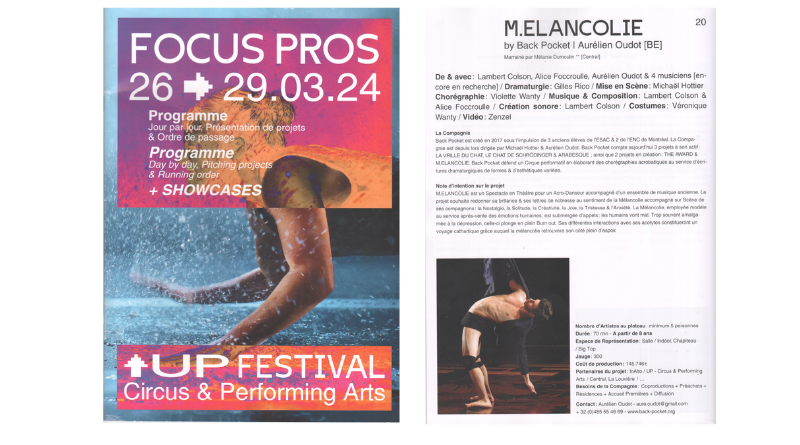Creating Circus Work – From Inspiration To Stage: The Pitch

In this trilogy of circus artist interviews, we delve into the personal journeys of three solo artists whose work, in varying stages of development, was recently presented at UP Festival in Brussels.
Our first installment featuresM.Elancolie, a new work by French artist and co-director of Back Pocket, Aurélien Oudot. Oudot and long-time creative collaborator Michaël Hottier, supported by their industry mentor Mélanie Dumoulin from Central, La Louvière, took to the podium to present their new work slated for 2025.

M.ELANCOLIE is a theatrical show for an Acro-Dancer accompanied by an early music ensemble. The project aims to restore the brilliance and nobility of the feeling of Melancholy, accompanied on stage by its companions: Nostalgia, Loneliness, Creativity, Joy, Sadness, and Anxiety. Melancholy, a model employee in the after-sales service of human emotions, is inundated with calls: humans are in a bad way. Too often lumped together with depression, she plunges into a full-blown burn-out. Her various interactions with her acolytes are a cathartic journey that will restore Melancholy’s hopeful side.
In addition to sharing their show concept—a combination of text, images, and video—pitching artists provide the room full of industry professionals with their show’s technical requirements, timeline, creative team, and budget, all in the hopes of securing new partnerships and eventual presenting opportunities.
Stacy Clark (SC): How and when did you get started in circus arts, and who were your teachers, mentors and role models?
Aurélien Oudot (AO): I started Circus when I was 11 years old. After a few years of practice in gymnastics I realized that competition wasn’t for me. My parents put me in a circus school because it had similar physical demands but with an artistic and community approach. Thus I joined the Cirque Nomade in Boulogne-Billancourt, France, and studied with Gaël Massot, Lyn Yung-Biau, and Loï Marquez, watching the 7 Fingers and Cirque du Soleil’s shows. Quickly the Cruz brothers became a role model, and I look up to artists from 7 Fingers and Cirque Eloize (Nomade, Rain, …)
SC: What was the genesis of your show concept?
AO: RegardingM.Elancolie, we wanted to work with Lambert Colson, director of the baroque ensemble InAlto, as melancholy imposes itself as a common subject both in the musical repertoire of his company and as a recurring topic in my research.
SC: Describe the timeline and planned creation process of this new work: for example, your acrobatic research, dramaturgical process, and collaborations with musicians as well as other members of BackPocket.
AO: There will first be a stage of three weeks of research and experimentation in 2024, to develop acrobatic material as well as technical trials (videos and set) before diving into the actual creation, which is going to take two full months in 2025/early 2026.
I started working on the show back in 2020 during COVID, brainstorming with Lambert and Michael Hottier, with whom I co-direct the company. He will be fully involved in the creation process as an outside eye, helping me put everything together.

SC: Tell us how you prepare to pitch your work at a festival such as UP Festival.
AO: Pitching at UP Festival is a hard exercise. I needed to clarify my project but also consolidate partnerships with theaters, even though the show is still in its very beginning stage. After that, it took me a few weeks of practice to be able to be as clear as possible at pitching the project. Also, being so early in the process, I needed to find a way to express what the show will be without any footage; that wasn’t easy.
SC: What learnings and benefits do you gain from pitching your work at the UP Festival showcase?
AO: It’s still a difficult exercise for me, but being able to identify your needs and be as clear as possible to present your project is really valuable. Also, this kind of gathering allows you to be in direct contact with different directors and professionals; it can help and accelerate a lot of exchange and discussion. It’s worth doing for sure.
Editor's Note: At StageLync, an international platform for the performing arts, we celebrate the diversity of our writers' backgrounds. We recognize and support their choice to use either American or British English in their articles, respecting their individual preferences and origins. This policy allows us to embrace a wide range of linguistic expressions, enriching our content and reflecting the global nature of our community.
🎧 Join us on the StageLync Podcast for inspiring stories from the world of performing arts! Tune in to hear from the creative minds who bring magic to life, both onstage and behind the scenes. 🎙️ 👉 Listen now!
